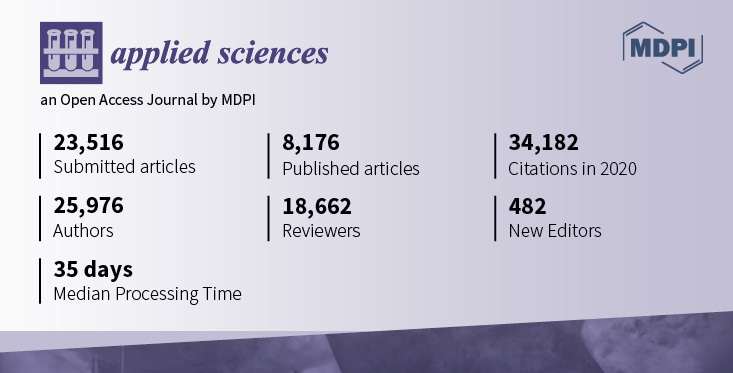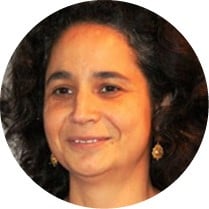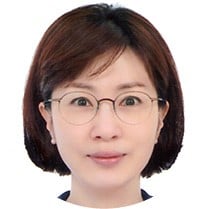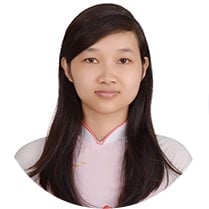
Journal Menu
► ▼ Journal Menu-
- Applied Sciences Home
- Aims & Scope
- Editorial Board
- Reviewer Board
- Topical Advisory Panel
- Instructions for Authors
- Special Issues
- Topics
- Sections & Collections
- Article Processing Charge
- Indexing & Archiving
- Editor’s Choice Articles
- Most Cited & Viewed
- Journal Statistics
- Journal History
- Journal Awards
- Society Collaborations
- Conferences
- Editorial Office
Journal Browser
► ▼ Journal BrowserNeed Help?
Announcements
3 March 2021
Applied Sciences | Four New Sections Established
In order to specifically develop different research areas and attract more high-quality papers, we are pleased to announce the addition of the following four new sections in Applied Sciences to cover all the disciplines of natural and applied science:
- Applied Adhesion;
- Applied Thermal Engineering;
- Agricultural Engineering;
- Additive Manufacturing Technologies.
We are now recruiting Editorial Board Members (EBMs) for these sections. If you are an active researcher in one of the aforementioned fields and are passionate about publishing cutting-edge research, please do not hesitate to get in touch (applsci@mdpi.com). Alternatively, you may wish to submit your work directly via the following link: https://susy.mdpi.com/user/manuscripts/upload/f316fed2fcf2df49bac3cf6c3323ec06?journal=applsci.
Applied Sciences is an international, peer-reviewed, multidisciplinary, and open access journal published quarterly online by MDPI. The journal covers all aspects of applied physics, applied chemistry, engineering, environmental and earth sciences, and applied biology.
20 February 2021
Applied Sciences | 2020 Review
In 2020, Applied Sciences received 23,516 articles and published 8176 articles with 25,976 authors,and 18,662 researchers who reviewed a manuscript for us. Applied Sciences articles were cited an estimated 34,182 times in 2020. All submitted manuscripts are peer-reviewed and time from submission to publication is approximately 35 days.
Applied Sciences received the 2019 impact factor (2.474) and established six new sections in 2020 on “Membrane Science and Technology", "Robotics and Automation", "Aerospace Science and Engineering", "Marine Engineering", "Applied Microbiology", and "Applied Micromedicine”.

High Altmetric Papers
- Effect of Fiber-Reinforced Polymer Tubes Filled with Recycled Materials and Concrete on Structural Capacity of Pile Foundations
Visar Farhangi et al.
Appl. Sci. 2020, 10(5), 1554; doi: 10.3390/app10051554
- A Novel Transfer-Learning-Based Approach for Pneumonia Detection in Chest X-ray Images
Vikash Chouhan et al.
Appl. Sci. 2020, 10(2), 559; doi: 10.3390/app10020559
- Debonding Detection of Reinforced Concrete (RC) Beam with Near-Surface Mounted (NSM) Pre-Stressed Carbon Fiber Reinforced Polymer (CFRP) Plates Using Embedded Piezoceramic Smart Aggregates (SAs)
Yang Liu et al.
Appl. Sci. 2020, 10(1), 50; doi: 10.3390/app10010050
- Control and Backbone Identification for the Resilient Recovery of a Supply Network Utilizing Outer Synchronization
Liang Geng et al.
Appl. Sci. 2020, 10(1), 313; doi: 10.3390/app10010313
- Effect of Micropiles on Clean Sand Liquefaction Risk Based on CPT and SPT
Visar Farhangi et al.
Appl. Sci. 2020, 10(9), 3111; doi: 10.3390/app10093111
Collections/Special Issues
Applied Sciences runs Special Issues to create collections of papers on specific topics. The aim is to build a community of authors and readers to discuss the latest research and develop new ideas and research directions. Special Issues are led by Guest Editors who are experts in the subject, who oversee the editorial process for papers. Papers published in a Special Issue will be collected together on a dedicated page of the journal website. High-quality Collections/Special Issues will be printed as books. The book can be made available on Amazon, eBookMall, Apple books, etc.
Top Downloaded Topics:
Open Calls:
- New Achievements in Structural Dynamics Analysis
edited by Marek Krawczuk and Magdalena Palacz
submission deadline: 30 June 2021
- Optical Design and Engineering
edited by Pin Han, Chun Hung Lai, Yi Chin Fang and Ye Zhi Ting
topical collection
- Topological Optimization in Engineering Design
edited by Boyan Stefanov Lazarov
submission deadline: 30 October 2021
Read full list of call for papers at https://www.mdpi.com/journal/applsci/special_issues.
On behalf of the editorial team, we would like to express our gratitude to the Editor-in-Chief of Applied Sciences, all Section Editors-in-Chief and Editorial Board Members, as well as to the Guest Editors of Special Issues, Topic Board Members, and Reviewer Board Members, all of whom have ensured the continued success of the journal through their hard work and diligence!
In 2021, Applied Sciences will continue to contribute to academic exchange and sharing of knowledge.
20 February 2021
Applied Sciences | Presenting 2021 Travel Award Winners
We are pleased to announce the winners of the 2021 Travel Awards, sponsored by MDPI and Applied Sciences. The awards were granted to nine outstanding young researchers working in thematic areas:
|
Applied Sciences 2021 Travel Award in Applied Biosciences and Bioengineering |
|
|
Dr. Caroline Sarah Taylor is currently working as a postdoctoral research associate in biomaterials and tissue engineering at the University of Sheffield. Dr. Caroline Sarah Taylor is a young researcher with considerable experience in different areas of biomaterials. |
|
|
Applied Sciences 2021 Travel Award in Chemistry |
|
|
Dr. Raquel Viveiros is a postdoctoral researcher at the Associated Laboratory for Green Chemistry (LAQV), Faculty of Sciences and Technology, NOVA University, Lisbon, Portugal. Dr. Raquel Viveiros is currently developing BioMIPs: molecularly imprinted polymers using green technologies, in particular using supercritical carbon dioxide (scCO2), with high affinity for biomolecules for potential use in biopurification processes. |
|
|
Applied Sciences 2021 Travel Award in Energy |
|
|
Dr. Alfonso González Briones received a Ph.D. in Computer Engineering from the University of Salamanca in 2018. Currently, he is a Juan De La Cierva postdoc with the GRASIA Research Group at the University Complutense of Madrid in the Software Engineering and Artificial Intelligence Department. He was the project manager of Industry 4.0 and IoT projects with the AIR-Institute and was also a lecturer in the Master of Industry 4.0 program at the International University of La Rioja (UNIR). |
|
|
Applied Sciences 2021 Travel Award in Environmental and Sustainable Science and Technology |
|
|
Dr. Alen Horvat completed a university degree in food processing with the Biotechnical Faculty at the University of Ljubljana, focused on heavy metal contaminants in vegetables. In August 2016, Dr. Alen Horvat completed a Ph.D. with the Carbolea research group (http://www.carbolea.ul.ie/) at the University of Limerick, Ireland. His Ph.D. scope can be described as experimental investigation of biomass-to-energy. |
|
|
Applied Sciences 2021 Travel Award in Materials |
|
|
Dr. Marie Švecová started her studies at UCT Prague in 2010 in a bachelor of analytical and physical chemistry program. Dr. Marie Švecová is interested in the advanced vibrational spectroscopic techniques including surface-enhanced (SEVS) and near-field, and the development of novel enhancing substrates of SEVS. |
|
|
Applied Sciences 2021 Travel Award in Mechanical Engineering |
|
|
Dr. Eng. Venanzio Giannella has a strong scientific background in numerical and experimental research involving the main aspects of machine design, such as: material strength, fatigue, vibrations, composite materials, and the finite element method. |
|
|
Applied Sciences 2021 Travel Award in Nanotechnology and Applied Nanosciences |
|
|
Dr. Michaël Lobet is a postdoctoral fellow in the Physics Department, UNamur. His research interests combine photonics, materials science, quantum, and solid-state physics. Dr. Michaël Lobet works on nanoscale light–matter interactions in a broad sense: perfect absorption using metamaterials, plasmonics, non-linear optics, photovoltaics, 2D electrodynamics, near-zero refractive index materials, molecular electronic,s and biophotonics. |
|
|
Applied Sciences 2021 Travel Award in Optics and Lasers |
|
|
Dr. Lam Thi Ngoc Tran is a post-doc researcher working in the CSMFO Lab-CNR-IFN in Trento. She enjoys experimenting and working creatively to find appropriate solutions to challenging problems arising in the photonics industry, especially for life sciences, biomedical, and agri-food applications. |
|
|
Applied Sciences 2021 Travel Award in Acoustics and Vibrations |
|
|
Dr. Mei started his Ph.D. in the spring 2016. He completed his M.E. in aerospace engineering at the University of South Carolina (USC) in 2017. The focus of Dr. Mei's research is the theoretical modeling and experimental validation of guided-wave propagation and interactions with damage in composite materials. |
This has been a difficult decision given the collection of high-quality applications received for the awards. We would like to thank all the applicants for submitting such a range of diverse and fascinating research topics and congratulate the winners on their accomplishment.
For more information about Applied Science awards, please visit here.
15 December 2020
MDPI adopts C4DISC principles to improve diversity and inclusion in scholarly communications
MDPI is proud to adopt the principles of the Coalition for Diversity & Inclusion in Scholarly Communications (C4DISC) to support building equity, inclusion, diversity, and accessibility in scholarly communications.
The C4DISC represents organizations and individuals working in scholarly communications and is focused on addressing issues of diversity and inclusion within the publishing industry.
MDPI’s Managing Editors encourage the Editors-in-Chief and Associate Editors to appoint diverse expert Editorial Boards. This is also reflective in our multi-national and inclusive workplace. We are proud to create equal opportunities without regard to gender, ethnicity, geographic location, sexual orientation, age, disability, political beliefs, religion, or socio-economic status. There is no place for discrimination in our workplace and editors of MDPI journals are to uphold these principles in high regard.
Representatives from C4DISC meet monthly, and have started to implement initiatives to shed light and improve on the lack of diversity in scholarly communications. Some of the initiatives include developing a joint statement of principles; conducting market research; providing training resources, best practices, toolkits, and documentation for our collective memberships; and establishing outreach programs, curricula, events, and publications.
The Coalition is committed to:
- eliminating barriers to participation, extending equitable opportunities across all stakeholders, and ensuring that our practices and policies promote equitable treatment and do not allow, condone, or result in discrimination;
- creating and maintaining an environment that respects diverse traditions, heritages, and experiences;
- promoting diversity in all staff, volunteers, and audiences, including full participation in programs, policy formulation, and decision-making;
- raising awareness about career opportunities in our industries to groups who are currently underrepresented in the workforce;
- supporting our members in achieving diversity and inclusion within their organizations.
14 December 2020
Article Layout and Templates Revised for Future Volumes
At MDPI we have slightly revised the layout for articles to be published in the 2021 Volume, starting at the end of December 2020. As of today, the article templates available for download on ‘Instructions for Authors’ pages have been updated.
The most noticeable change can be found on the first page of the article, where a left-hand column has been created to include the following front matter elements: (i) the recommended citation style for the article, (ii) the publishing history, (iii) as well as the Creative Commons Attribution license used (iv) a standard note regarding affiliations. At the same time, the extra spacing on the left means the authors’ affiliations are now more clearly set apart than before. Other front matter key elements such as journal logo, article type, article title, authors, abstract and keywords remain unchanged.
The blank column on the left runs through all pages in an article; as a result, the main text is slightly more condensed, which improve reader friendliness for smaller screens. Small figures/tables are aligned on the left with standard indenture, while large figures/tables are centered and covering the full width of the page. The revised layout was applied in the article pictured below, to serve as an example:

1) Information is displayed in the left information bar.

2) In the main text, there is a blank column on the left.

3) Small tables/figures are aligned on the left, large tables/figures are centered.
11 December 2020
2020 "Highly Cited Researchers" on MDPI Journal's Editorial Boards
We are pleased to acknowledge that many academic editors who have made an impact on MDPI journals as editorial board members, editors-in-chief, or section editors, are recognized as 2020 Highly Cited Researchers by Clarivate.
Highly Cited Researchers highlights the top 1% of researchers, by citations, in one or more of the 22 fields used in Clarivate Analytics Essential Science Indicators. We offer our congratulations to 279 academic editors of MDPI journals who were recognized as the most influential scholars in their fields in 2020.
Adams, Dave Agarwal, Ravi P. Ahn, Choon Ki Ahn, Myung-Ju Albrecht, Randy A. Andersson, Dan I. Anker, Stefan D. Apergis, Nicholas Ariga, Katsuhiko Artaxo, Paulo Balsamo, Gianpaolo Barba, Francisco J. Benediktsson, Jon Atli Benelli, Giovanni Bhatnagar, Amit Bialystok, Ellen Blaabjerg, Frede Blay, Jean-Yves Bogers, Marcel Bolton, Declan J. Boyer, Cyrille Brocca, Luca Bruix, Jordi Buhalis, Dimitrios Burdick, Jason A. Byrd, John C. Cabeza, Luisa F. Cabrerizo-Lorite, Francisco Javier Cai, Jianchao Calhoun, Vince D. Cantu, Robert C. Cerqueira, Miguel Chang, Jo-Shu Chau, Kwok-wing Chemat, Farid Chen, Jianmin Chen, Jun Chen, Min Chen, Shaowei Chen, Wei Chen, Wei-Hsin Chen, Xiaofeng Chen, Yangkang Chen, Zhi-Gang Chiclana, Francisco Corella, Dolores Cortes, Javier Cortes, Jorge Cummings, Kenneth Michael Dai, Shifeng Decker, Eric A. DePinho, Ronald A. Dimopoulos, Meletios-Athanasios Dincer, Ibrahim Du, Yihong Dupont, Didier Edwards, David Ellahi, Rahmat Ellis, Erle C. ElMasry, Gamal Esteller, Manel Estruch, Ramón Fang, Chuanglin Fasano, Alessio Fernandez-Lafuente, Roberto Ferreira, Isabel Fortino, Giancarlo Galluzzi, Lorenzo Galvano, Fabio Gandomi, Amir H. Gandomi, Amir H. Gao, Bin Gao, Feng Gao, Wei Garbe, Claus García, Hermenegildo Geschwind, Daniel H. Giampieri, Francesca Giralt, Sergio A. Glanz, Karen Goldewijk, Kees Klein Gössling, Stefan Govindan, Kannan Granato, Daniel Grosso, Giuseppe Grosso, Giuseppe Guerrero, Josep M. Haase, Dagmar Hagger, Martin S. Hamblin, Michael R. Han, Heesup Jankovic, Joseph Janotti, Anderson |
Jiang, Hai-Long Kalaji, Hazem M. Kalantar-Zadeh, Kourosh Kaner, Richard B. Karimi, Hamid Reza Kataoka, Kazunori Keesstra, Saskia Kepp, Oliver Kerminen, Veli-Matti Keyzers, Robert A. Khademhosseini, Ali Khan, Nafees A. Kim, Ki-Hyun Klemeš, Jiří Jaromír Klenk, Hans-Peter Konopleva, Marina Y. Krammer, Florian Krebs, Frederik C. Kroemer, Guido Kudo, Masatoshi Kurths, Juergen Kurzrock, Razelle Kuznetsov, Nikolay V. Kyrpides, Nikos C. La Vecchia, Carlo Lai, Yuekun Lam, James Lancellotti, Patrizio Lee, Sangmoon Leung, Victor C. M. Li, Jinghong Li, Yurui Lindahl, José M. Merigó Lip, Gregory Y. H. Loh, Xian Jun Long, Hualou Lund, Henrik Luo, Jingshan Luque, Rafael Lyons, Timothy W. Ma, Jun Ma, Wen-Xiu Ma, Yanming Maeda, Keisuke Makarova, Kira Mantovani, Alberto Martín-Belloso, Olga Martinoia, Enrico Marzband, Mousa Masclaux-Daubresse, Celine Masson, Patrick Mateos, María Victoria Mathiesen, Brian Vad Matyjaszewski, Krzysztof McArthur, Grant A. McCauley, Darren Medlock, Jolyon M. Melero, Ignacio Mezzetti, Bruno Miroshnichenko, Andrey E. Moran, Daniel Mueller, Lukas A. Mueller-Roeber, Bernd Naushad, Mu Nemeroff, Charles B. Nieto, Juan J. O'Donnell, Colm Ogino, Shuji Olabi, Abdul-Ghani O'Regan, Donal Orsini, Nicola Oswald, Isabelle P. Ozcan, Aydogan Pahl-Wostl, Claudia Pang, Huan Payne, James E. Peng, Shushi Perc, Matjaz Perez-Alvarez, Jose Angel Piquero, Alex R. Ploss, Alexander Postolache, Mihai Pradhan, Biswajeet Prinsep, Michele R. Qian, Dong Qu, Xiaogang Reiter, Russel J. Riahi, Keywan Richter, Andreas Rignot, Eric Robert, Caroline Ros, Emilio Rosell, Rafael |
Rosen, Marc A. |
The full list of 2020 Highly Cited Researchers can be accessed on https://recognition.webofsciencegroup.com/awards/highly-cited/2020/
--- Highly Cited Researchers (HCR) is a Clarivate product.
19 November 2020
Recruiting Editors for New Section “Applied Microbiology” in Applied Sciences
In order to better categorize papers published within the journal, the section “Applied Microbiology” has recently been established. We are now recruiting Editorial Board members for this new section.
If you are an active researcher in the field and are passionate about participating in cutting-edge research publications, please do not hesitate to get in touch (applsci@mdpi.com). As an Editorial Board member, you will have the following responsibilities:
- To make decisions on whether a manuscript can be accepted, or not, based on the reports we collect;
- To serve as Editor of a Special Issue on a topic related to your research interests when it is convenient for you;
- To review some manuscripts in your area of interest and when you are available;
- To recommend timely topics or appropriate conferences;
- To promote Applied Sciences and increase its visibility at related academic conferences.
19 November 2020
Recruiting Editors for New Section “Applied Micromedicine” in Applied Sciences
In order to better categorize papers published within the journal, the section “Applied Micromedicine” has recently been established. We are now recruiting Editorial Board members for this new section.
If you are an active researcher in the field and are passionate about participating in cutting-edge research publications, please do not hesitate to get in touch (applsci@mdpi.com). As an Editorial Board member, you will have the following responsibilities:
- To make decisions on whether a manuscript can be accepted, or not, based on the reports we collect;
- To serve as Editor of a Special Issue on a topic related to your research interests when it is convenient for you;
- To review some manuscripts in your area of interest and when you are available;
- To recommend timely topics or appropriate conferences;
- To promote Applied Sciences and increase its visibility at related academic conferences.
3 November 2020
1st Webinar of Applied Sciences: Recent Advances in the Development and Application of Green Extraction Techniques—13 November 2020

Nowadays, more than ever, new strategies need to be developed and implemented to reduce the environmental burden of extraction techniques that are intensively used across all sectors of the (bio)economy and analytical laboratories. The ongoing works towards alternative greenest extraction methodologies, and consequently those contributing to an imperative World Sustainable Development, need to be disseminated to expand the acquired knowledge to other fields and to provide the needed impetus for overcoming the existent limitations.
Thus, the goal of the webinar “Recent Advances in the Development and Application of Green Extraction Techniques” is to share experiences and promote discussion on novel (experimental or theoretical) challenges, advances, and outlooks concerning the development and/or applications of Green Extraction Methodologies. You are all invited to participate!
Date: 13 November 2020
Time: 02:00 pm (CEST)丨2:00 am (EDT)丨10:00 pm (CST ASIA)
Webinar ID: 830 4635 8756
Register for Free Here: https://applsci-1.sciforum.net/
Chair:
 |
Prof. Dr. Simone Morais Editorial Board Member of Applied Sciences |
|
Interests: environmental chemistry; green chemistry; new methodologies for (electro)analysis; (bio)sensors; application of functional nanostructured materials |
Speakers:
 |
Associate Prof. Anastasia Detsi |
|
Presentation: " Exploring Natural Deep Eutectic Solvents as Green Extraction Media of Bioactive Phytochemicals” |
|
 |
Associate Prof. Dimitris P. Makris |
|
Presentation: " Natural Deep Eutectic Solvents & their Applications in Polyphenol Extraction – Overview, Challenges, Prospects” |
|
 |
Associate Prof. Jeongmi Lee |
|
Presentation: " Application of Deep Eutectic Solvents as Green Extraction Solvents for Natural Bioactive Compounds” |
For any questions about the webinar, please send an email to applsci.webinar@mdpi.com
13 October 2020
1st International Electronic Conference on Applied Sciences – Open for Submission

We are pleased to announce that the 1st Electronic Conference on Applied Sciences, chaired by Prof. Dr. Takayoshi Kobayashi from The University of Electro-Communications, Tokyo, Japan will be held from 10 to 30 November 2020 at Sciforum (https://sciforum.net/conference/ASEC2020). All proceedings will be held online.
These are some of the topics that we expect to cover:
- Optics and Lasers
- Nanotechnology and Applied Nanosciences
- Energy
- Materials
- Chemistry
- Acoustics and Vibrations
- Applied Biosciences and Bioengineering
- Environmental and Sustainable Science and Technology
- Applied Physics
- Computing and Artificial Intelligence
- Applied Dentistry
The conference will be completely free of charge—both to attend, and for scholars to upload and present their latest work on the conference platform. There will also be the possibility to submit selected extended papers to the Special Issue of the conference entitled. For information about the procedure for submission, peer review, revision, and acceptance of conference proceedings papers, please refer to the section “Instructions for Authors”.
**Important Dates**:
- Abstract Submission: 28 October 2020
- Notification of Acceptance: 30 October 2020
- Paper Submission Deadline: 31 October 2020
Conference Open: 10–30 November 2020
For more information on IOCN2020, please visit the conference website (https://sciforum.net/conference/ASEC2020) or contact us by email (asec2020@mdpi.com).













